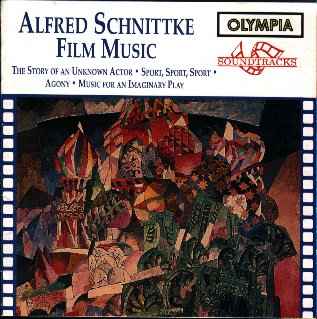
Alfred Schnittke died this year (1998). His passing will no doubt attract
many retrospectives and the BIS complete edition will continue to unfold,
nicely complemented by the Chandos discs.
Little recognised in his oeuvre is his film music and but for this disc I
would not have known about it. First of all let me confess, far from proudly,
my ignorance of Schnittke's concert music. I recall hearing a neo-classical
concerto grosso in the early 1980s but have heard (or chosen to hear) little
since then. The present disc is my first substantial introduction to his
music.
The Story of an Unknown Actor (1976 - 23:19 - 12 tracks) This opens
with a noble surging and pushing theme for harpsichord and strings. There
is a suggestion of the grand baroque concerto about this music but it has
much more emotion and visceral excitement. This is extremely striking music
headlong and desperate with a vein of sadness. The second track has a plangent
solo piano which again is slightly sad. This represents a Russian eclogue
or an updated shadow of the slow movement of a late Mozart Piano concerto.
The first and second movement theme is projected by a vibraphone with the
merest touches from the piano in the third track. The theme is then presented
in pizzicato stepwise and fugally developed [5]. Desperately attractive material.
The theme is successively taken by clarinet with orchestra [5] and solo cello
[6]. An urgently alarmed and alarming harpsichord and plucked strings with
closely echoing harpsichord next take the foreground [7]. This then relaunches
the surging string opening from [1]. The eighth track is a luxuriantly sad
string serenade with solo piano gently intoning. The music is not far removed
from the hyper-romanticism of Rachmaninov's second piano concerto. Tracks
9 and 10 use what sounds like a slightly out-of-tune parlour piano tackling
Rachmaninov with velvety string-writing keeping the music air-borne. There
is a very Russian waltz [11] for strings perhaps escaping via a fractured
mirror from Tchaikovsky's Serenade and Sibelius's Pelleas et Melisande. The
surging theme returns for the last two tracks touched in with utmost gentleness
and humility by the xylophone [12] and [13] and with a contented sadness.
Imagine this music not being heard on Radio 3 or Classic FM! Unforgivable!
Sport, Sport, Sport (1970 - 6 tracks - 9:51) The first track comprises
broken bugle calls. Then in Greece there are Xenakis-like clashings of wood,
brass and metal. Next follows a 1960s swinging clarinet in a Bach-like coolness.
Synthesised keyboards and piano and xylophone dominate the next track. Track
19 opens with a Tippettian hammering soon overtaken by rip-tide rushing of
the solo piano. The final track is extremely impressive catching the splendour
of a dizzily high winds. A dazzling track.
Agony (1973-74 - 6 tracks - 15:04) Dark mutterings and bell-like sounds
dominate [20]. Dies Irae is suggested over a hammered beat running in terror
through the music [21] mixed with apocalyptic shoutings. This is followed
by the blackest of waltzes on Dies Irae. This is a depressive's waltz of
the type and style found in Prokofiev's Romeo and Juliet. Farewell features
bells stridently clamorous and occasionally dissonant. The conclusion has
the feel of a heroically fulfilled epic journey spurred on by hammered snare
drum and topped off by solo piano and jingles. The last track of the suite
is turbulent but with a satisfying sense of attainment. A percussive piano
figure strides over apocalyptic world-ending music.
Music for an Imaginary Play (1985 - 3 tracks - 7:03) These three tracks
are a complete contrast. The first sounds like a scattily weird and dangerously
manic dance for the Goons. Next comes a cool Debussian solo flute interlude
- Dreams of a Faun! Finally we get more of the Goons in an utterly stupid-headed
march. The outer two tracks sound distinctly and threateningly satirical.
This CD dates from 1994 although I can only guess at the vintage of the original
recordings. Sound quality is vivid. By the sound of it these are studio
re-recordings rather than taken direct from soundtrack. There is the merest
hint of overload in the heaven-clawing intensity of the strings of Story
of an Unknown Actor. Nothing to worry about. The notes are, as ever with
Olympia, excellent.
Recommended strongly.
Reviewer
Rob Barnett
tar.gif)


